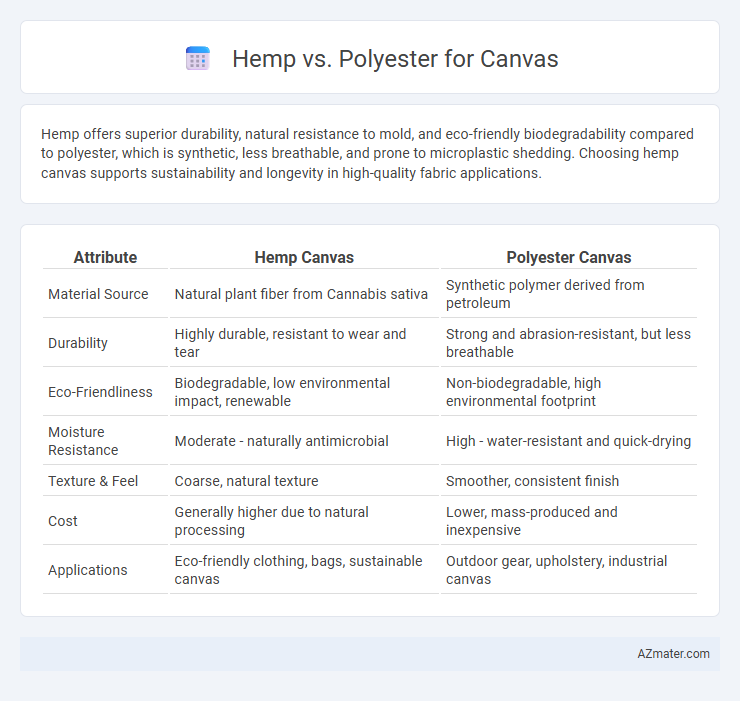Hemp offers superior durability, natural resistance to mold, and eco-friendly biodegradability compared to polyester, which is synthetic, less breathable, and prone to microplastic shedding. Choosing hemp canvas supports sustainability and longevity in high-quality fabric applications.
Table of Comparison
| Attribute | Hemp Canvas | Polyester Canvas |
|---|---|---|
| Material Source | Natural plant fiber from Cannabis sativa | Synthetic polymer derived from petroleum |
| Durability | Highly durable, resistant to wear and tear | Strong and abrasion-resistant, but less breathable |
| Eco-Friendliness | Biodegradable, low environmental impact, renewable | Non-biodegradable, high environmental footprint |
| Moisture Resistance | Moderate - naturally antimicrobial | High - water-resistant and quick-drying |
| Texture & Feel | Coarse, natural texture | Smoother, consistent finish |
| Cost | Generally higher due to natural processing | Lower, mass-produced and inexpensive |
| Applications | Eco-friendly clothing, bags, sustainable canvas | Outdoor gear, upholstery, industrial canvas |
Introduction to Hemp and Polyester Canvas
Hemp canvas is crafted from fibers of the hemp plant, known for its exceptional durability, breathability, and eco-friendly cultivation without pesticides or synthetic fertilizers. Polyester canvas, derived from synthetic polymers, offers strong resistance to water, stretching, and fading, making it a popular choice for outdoor and heavy-duty applications. Both materials serve distinct purposes, with hemp valued for sustainability and natural texture, while polyester is preferred for cost-effectiveness and enhanced weather resistance.
Environmental Impact Comparison
Hemp canvas has a significantly lower environmental impact than polyester due to its biodegradable nature and minimal pesticide use during cultivation. Polyester production relies heavily on petroleum, contributing to higher greenhouse gas emissions and microplastic pollution. Choosing hemp over polyester supports sustainable agriculture and reduces long-term ecological damage.
Durability and Longevity
Hemp canvas offers superior durability and longevity compared to polyester, boasting natural resistance to wear, tear, and UV damage. Its fibers strengthen over time, making hemp a sustainable and robust choice for heavy-duty applications. Polyester canvas, while resistant to mildew and water, tends to degrade faster under prolonged exposure to sunlight and abrasion.
Breathability and Comfort
Hemp canvas offers superior breathability due to its natural fibers, allowing moisture to escape and enhancing overall comfort during extended use. Polyester canvas, while durable and water-resistant, tends to trap heat and moisture, reducing ventilation and comfort in warm conditions. Selecting hemp over polyester for canvas applications improves airflow, making it ideal for breathable, comfortable products like bags and apparel.
Water Resistance and Weather Performance
Hemp canvas offers superior water resistance and durability due to its natural oils and dense fiber structure, making it highly effective against moisture and mold in various weather conditions. Polyester canvas, while less breathable, provides excellent water repellency and quick-drying properties thanks to its synthetic fibers and tight weave technology. Both materials perform well outdoors, but hemp's eco-friendly composition enhances its weather resistance without compromising strength or longevity.
Ease of Maintenance and Cleaning
Hemp canvas offers superior ease of maintenance due to its natural resistance to mold, mildew, and dirt, requiring only gentle washing with mild soap and water. Polyester canvas stands out for its quick-drying properties and strong resistance to stains and shrinking, making it ideal for low-maintenance applications. Both materials provide durable options, but hemp's natural fibers are more breathable, while polyester's synthetic composition enhances its cleaning convenience.
Production Costs and Affordability
Hemp canvas production requires fewer chemicals and less water, contributing to lower environmental impact but often higher initial costs due to limited large-scale farming infrastructure. Polyester canvas benefits from established industrial manufacturing, resulting in significantly lower production expenses and more affordable pricing for consumers. While hemp offers durability and sustainability, polyester remains the more cost-effective option for budget-conscious buyers.
Aesthetic Qualities and Texture
Hemp canvas boasts a natural, earthy aesthetic with a coarse, tactile texture that enhances the artisanal appeal of artworks and prints. Polyester canvas offers a smoother, more uniform surface with a slight sheen, providing vibrant color reproduction and a contemporary look. The choice between hemp and polyester hinges on desired texture authenticity versus color vibrancy and sheen.
Applications in Art and Industry
Hemp canvas offers superior durability, natural resistance to mold and UV light, and eco-friendly qualities, making it ideal for sustainable art projects and industrial applications such as heavy-duty bags and upholstery. Polyester canvas provides high tensile strength, water resistance, and colorfastness, preferred in industrial uses like outdoor banners, automotive covers, and industrial tarps. Artists favor hemp for its organic texture and longevity, while polyester suits projects requiring vivid printing and weatherproof materials.
Choosing the Right Material for Your Canvas Needs
Hemp offers superior durability, natural resistance to UV rays, and eco-friendly qualities ideal for long-lasting canvas projects. Polyester, known for its moisture-wicking properties and affordability, provides a lightweight, wrinkle-resistant alternative suited for outdoor use. Selecting between hemp and polyester depends on your priority for sustainability, strength, and application environment to ensure optimal performance.

Infographic: Hemp vs Polyester for Canvas
 azmater.com
azmater.com